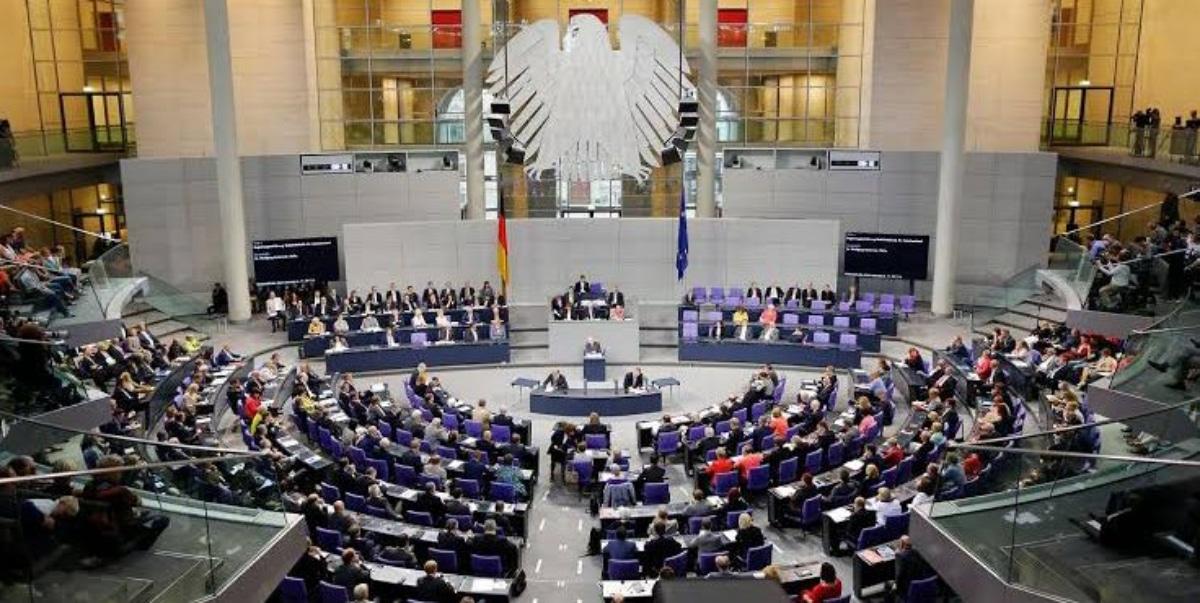Germany passed an immigration law last week Friday to open up new opportunities for job seekers from countries outside the EU and for many refugees who are already in the country. According to German’s Interior Minister of Social Democrats (SPD), Nancy Faeser, the draft law secures prosperity in Germany.

The German Parliament “It would only work if the bureaucratic hurdles were dismantled during its implementation,” she said. Like many countries in Europe, Germany is facing a shortage of skilled workers. In 2022, the country’s labour shortage rose to an all-time high: the Institute for Employment Research (IAB) found 1.74 million vacant positions throughout Germany. Together with Federal Chancellor Olaf Scholz, she emphasised removing bureaucracy and improving the digitisation and efficiency of the system, according to Euro News. “We know that we can only guarantee our future, the efficiency of our economy and the efficiency of our social security systems if we have enough skilled workers at our disposal,” said Scholz. “From within the European Union, that’s not so difficult, because there is freedom of movement. With regard to the rest of the world, it is a greater challenge,” he added. Here are key things to know about how the law opens job opportunities for Nigerians and other nationals. 1. According to Euro News, the reforms are to modernise the country’s immigration legislation expected to make it easier for third-country nationals to work in Germany. It could increase the number of non-EU workers in Germany by 60,000 per year. 2. The reforms to the Skilled Immigration Act particularly focus on workers with vocational, non-academic training. Existing rules for qualified professionals with university degrees will also be relaxed. 3. Germany is hoping to combat its shortage of skilled workers with a new ‘opportunity card’ called chancenkarte. The ‘chancenkarte’ will use a points system to enable workers with required skills to come to Germany more easily. 4. The points-based system will take into account qualifications, professional experience, age, German language skills and ties to Germany. 5. Every year, quotas will be set depending on which industries need workers. Three out of four of the following criteria must also be met to apply for the scheme: a degree or vocational training, three years’ professional experience, language skills or a previous stay in Germany and 35 years old or younger. 6. Currently, most non-EU citizens need to have a job offer before they can relocate to Germany. A visa for job seekers already exists, but the ‘chancenkarte’ is expected to make it easier and faster for people looking to find work in Germany. 7. Citizens of certain countries with visa agreements can already enter Germany for 90 days visa-free but are only permitted to take up short-term employment. 8. The opportunity card will allow people to come and look for a job or apprenticeship while in the country rather than applying from abroad. Applicants must be able to prove they can afford to pay their living expenses in the meantime. 9. The exact details of the scheme are yet to be formalised. The chancenkarte is not expected to be available until at least the end of 2023. 10. The new system will make it easier for people with professional experience – rather than a university degree – to come and work in Germany. 11. Germany will become more open to job experience and professional qualifications that are recognised in workers’ native countries. Currently, the country is strict about which qualifications it recognises. 12. It will also be easier for those without a job offer to seek work in Germany via the opportunity card. 13. Qualified job seekers with degrees or vocational certificates will be allowed to stay in the country for one year as they search for employment. While looking for full-time employment, they will be permitted to work up to 20 hours per week. 14. Rules will also be eased for those with a job offer and a recognised diploma. Salary thresholds will be lowered, it will be easier for workers to bring their families to Germany, and it will be easier to gain permanent residency. 15. Job opportunities are open in Germany for immigrants that are craftspeople, electrical engineers, IT specialists, careers, nurses, catering and hospitality professionals.


 Kai Havertz celebrates goal after scoring in opening four minutes – Getty image However, German national team coach Julian Nagelsmann who had other plans for the player, decided to deploy the 24-year-old in an unfamiliar left-back role, which relatively payed off. Explaining the tactical move, Nagelsmann said, “Kai won’t always be in this position. I have a great idea, he’s an exceptionally good footballer. This is a very good option. He won’t always play as a classic left-back.” Expressing their excitement, Arsenal fans on social media started making such comments like “Over to you Arteta”.
Kai Havertz celebrates goal after scoring in opening four minutes – Getty image However, German national team coach Julian Nagelsmann who had other plans for the player, decided to deploy the 24-year-old in an unfamiliar left-back role, which relatively payed off. Explaining the tactical move, Nagelsmann said, “Kai won’t always be in this position. I have a great idea, he’s an exceptionally good footballer. This is a very good option. He won’t always play as a classic left-back.” Expressing their excitement, Arsenal fans on social media started making such comments like “Over to you Arteta”. 


